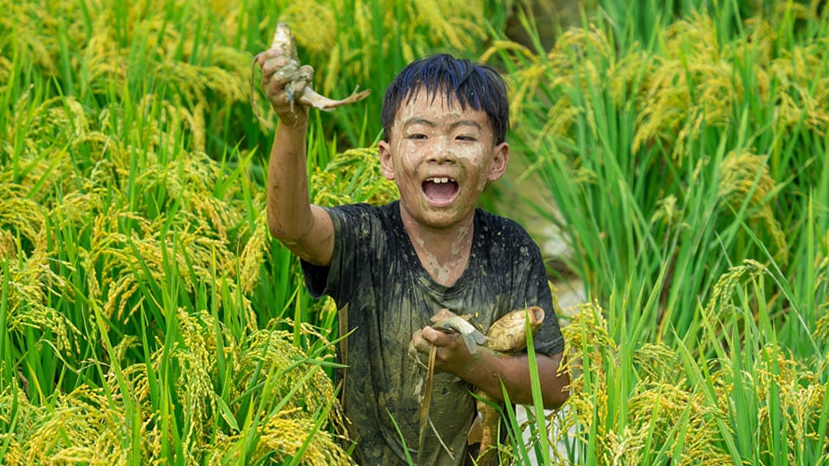Mountain village embarks on new journey toward prosperity
HOHHOT, Sept. 7 (Xinhua) -- In about two weeks, the mountain grapes will be ready for harvest in Maanshan Village, Chifeng City, north China's Inner Mongolia Autonomous Region.
"I will earn more than 20,000 yuan (about 2,868 U.S. dollars) instantly after the harvest," villager Zhang Guoli said while pruning the branches of grape vines in his four mu (about 2,666 square meters) field.
"Life is as sweet as grapes now," Zhang said. "The village is no longer what it used to be!"
Nestled away in a mountainous region, Maanshan Village was once marred by a lack of arable land and water resources. Corn and grain were the primary crops grown in the village, and some of the locals lived in abject poverty for generations.
China has secured a historic victory in the fight against absolute poverty and lifted nearly 100 million rural dwellers out of destitution in the past decade. The country has now embarked on a new journey to revitalize its countryside.
Like many villages around the country, Maanshan has witnessed a drastic change in its fortune.
FROM POVERTY TO PROSPERITY
To improve the lives of villagers, the former secretary of Maanshan's Party branch, Zhang Guozhi, brought in some breeds of mountain grapes in 2000, considering the favorable natural conditions in the village for mountain grapes to grow. Many of the locals started growing mountain grapes, expecting a higher income.
However, the sales of grapes became a challenge for the villagers. Due to the fluctuation of the market in 2009, a large quantity of harvested mountain grapes was left rotten in the field. Some villagers removed the grape trees in disappointment.
But the village cadres set up a specialized cooperative to purchase grapes grown by farmers and negotiate with wine companies for better sales. They also set up a grape juice-producing factory to move up the value chain.
Zhang Guoli, who started to grow mountain grapes in 2004, said the grapes only sold at less than 2 yuan per kilo at the beginning. "Now the cooperative buys the grapes from the farmers at 4 yuan per kilo, and our income has doubled."
Currently, Maanshan has 3,500 mu of grapes, and more than half of the local households are engaged in the industry. There are also two wine companies here.
Zhang still remembers the joy and excitement when he drank the wine produced by the cooperative for the first time in 2016. "I saw people drinking such wine on TV previously. It was unimaginable that we could produce such wine ourselves," he said.
Today, the wine produced in Maanshan is sold to many places across the country.
GREENER MOUNTAINS BRING GOLD
The concept that "lucid waters and lush mountains are invaluable assets" has evolved into a guideline for China's quest for green development. Villagers of Maanshan have seen "gold" generated by its ever greener mountains.
Thanks to boosting vegetation growth, the forest coverage rate in Maanshan has exceeded 90 percent. The mountains blocking the development of the village have been turned into invaluable assets, as the idyllic environment has attracted urban tourists.
Currently, 16 farmhouses are operating here. At the Maanju Farmhouse entrance, there are several massive stone kilns, and the hallmark of this place is its kiln barbeque.
"Yesterday, we served 27 tables of tourists and roasted a dozen sheep," said Zhang Lijun, manager of the farmhouse, adding that they plan to expand the business and rent a more spacious place soon.
The production of mushrooms and hazelnuts has also increased, thanks to Maanshan's greener mountains.
Du Zhongwei quit his job as a chef in the city three years ago and returned home to sell wild mushrooms through livestreaming.
"My audience place orders during my live broadcasts, which I stream while I'm up in the mountains collecting mushrooms," he said, adding that the mushrooms are always in short supply, and he once received an order from Japan.
TOWARD AN EVEN BETTER FUTURE
At the workplace of the village cadres in Maanshan, a chart hanging on the wall shows the information of several villagers who are facing livelihood difficulties. "Now we are monitoring those who are at the risk of returning to poverty," said Liu Yeyang, secretary of the village's Party branch.
According to Liu, the village got rid of poverty at the end of 2017. The per capita disposable income grew from 4,577 yuan in 2015 to 14,654 yuan at the end of 2019.
China has adopted a dynamic monitoring and support mechanism to prevent the once-poor population from falling into poverty again.
Capital assistance and health care services are available for villagers in need, according to Liu.
"Based on what we have achieved during the war against poverty, we are setting greater goals for future development," he said.
Earlier this year, the village started the construction of a tourism resort with a designed coverage area of about 111.5 hectares.
"The resort will be multi-functional, offering tourists chances to get to know the local culture, enjoy the natural sceneries, and do sports activities," Liu said. "We are currently constructing the first phase of the project, which will feature 17 museums and exhibition centers."
Since 2020, Zhang Guoli has worked as a local guide for visitors. "Besides the profit from the mountain grapes, I gain another 2,500 yuan every month as a tour guide," he said.
Zhang is looking forward to the completion of the tourism resort. "Our life will be even sweeter in the future," he said.
Photos
Related Stories
Copyright © 2022 People's Daily Online. All Rights Reserved.









